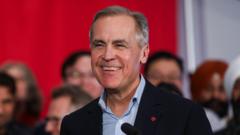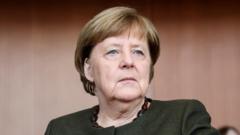Elon Musk has stirred controversy in Germany by endorsing the far-right Alternative for Germany (AfD) party, which is under surveillance for extremist views. His comments, published in a German newspaper, have drawn criticism and led to a journalist's resignation amid growing tensions as the country approaches snap elections.
Elon Musk's Controversial Endorsement of Germany's AfD Party

Elon Musk's Controversial Endorsement of Germany's AfD Party
The tech mogul's support for the far-right party sparks backlash and protests among journalists ahead of crucial elections.
Elon Musk, the world's wealthiest individual and an influential adviser to President-elect Donald Trump, has caused a stir in Europe following his endorsement of Germany’s far-right Alternative for Germany (AfD) party. His support for the party, flagged by domestic intelligence for its extremist stance, has created a wave of backlash in Germany.
In a recent opinion piece published in the conservative daily, Welt, Musk outlined his reasons for viewing the AfD as “the last spark of hope” for Germany. He articulated in his remarks that established political parties were failing to tackle critical issues, leading to economic stagnation and social discord within the country. Musk’s assertions come at a critical juncture, as Germany prepares for snap elections following the collapse of Chancellor Olaf Scholz's coalition government.
Germany is gearing up for elections on February 23, a decision formalized by President Frank-Walter Steinmeier after disbanding Parliament. The political landscape features a mix of four mainstream parties alongside three extremist factions. Polls indicate that while the traditionally conservative Christian Democratic Union may lead, the AfD is catching up with approximately 20 percent support due to its staunch anti-immigration stance.
The publication of Musk’s commentary has not only sparked debate across political lines but also caused dissent within the ranks of Welt’s editorial team. Reports have emerged of protests from staff against Musk’s views, culminating in the resignation of the newspaper's head of opinion, Eva Marie Kogel, who made her discontent publicly known via social media.
As the elections loom, Musk’s involvement in foreign political landscapes raises questions about the influence of billionaire entrepreneurs on democracy and the potential ramifications of their public statements on international politics. With strong divisions evident within Germany and abroad, the stage is set for a contentious political battle.
In a recent opinion piece published in the conservative daily, Welt, Musk outlined his reasons for viewing the AfD as “the last spark of hope” for Germany. He articulated in his remarks that established political parties were failing to tackle critical issues, leading to economic stagnation and social discord within the country. Musk’s assertions come at a critical juncture, as Germany prepares for snap elections following the collapse of Chancellor Olaf Scholz's coalition government.
Germany is gearing up for elections on February 23, a decision formalized by President Frank-Walter Steinmeier after disbanding Parliament. The political landscape features a mix of four mainstream parties alongside three extremist factions. Polls indicate that while the traditionally conservative Christian Democratic Union may lead, the AfD is catching up with approximately 20 percent support due to its staunch anti-immigration stance.
The publication of Musk’s commentary has not only sparked debate across political lines but also caused dissent within the ranks of Welt’s editorial team. Reports have emerged of protests from staff against Musk’s views, culminating in the resignation of the newspaper's head of opinion, Eva Marie Kogel, who made her discontent publicly known via social media.
As the elections loom, Musk’s involvement in foreign political landscapes raises questions about the influence of billionaire entrepreneurs on democracy and the potential ramifications of their public statements on international politics. With strong divisions evident within Germany and abroad, the stage is set for a contentious political battle.






















